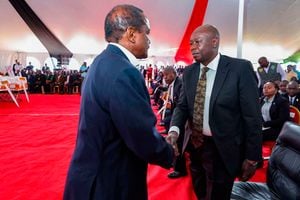Care, Shabaab could ride on MOU dispute

Somali security officers hold position on their open trucks near Syl Hotel, the scene of an al Qaeda-linked Al Shabaab group's attack in Mogadishu, Somalia March 15, 2024.
What you need to know:
- Al-Shabaab remains public enemy number one.
- Calls to jihad risks legitimising Al-Shabaab’s extremist ideology.
The controversial January 1 Memorandum of Understanding (MOU) between Ethiopia and Somaliland stirred a diplomatic hornet’s nest with Somalia and its key allies, including the United States, issuing strong condemnation and calling for neighbourly respect for national sovereignty.
Experts say the deal is lopsided at Somaliland’s expense, favouring Ethiopian access to the port. They see it as a precursor to Addis Ababa’s official recognition of the self-declared independent region of Somalia.
That could upset the status quo, and with a domino effect. Legislation by Somalia’s Federal Parliament nullifying the MOU was signed into law by President Hassan Sheikh Mohamud, who termed the deal as an act of naked aggression.
Worse, hoping to win the hearts and minds of Somalis already worn out from their attacks, Somalia-based terrorist group Al-Shabaab opposed the MOU. It launched a swift and robust anti-Ethiopia campaign with protests in Jilib, its de facto headquarters, and Janaale in Lower Shabelle.
Its mouthpiece and commander of the slaughter squad Amniyat, Ali Rage Dheere, termed the MOU as a violation of Somali maritime territory and sovereignty and threatened Ethiopia with bloodshed.
Propaganda machinery
He likened the lease of part of Somaliland’s coastline by Ethiopia to the Israeli occupation of Palestine.
Al-Shabaab might ride on the crisis to reinvent its image as a defender of Somalis and the Muslim lands.
But it’s a tall order, considering their atrocities against fellow Somalis — a case in point being Africa’s “worst” terror attack, where it butchered 512 Somalis in Madina district in October 2017.
This confirmed the fears of the MOU invigorating Al-Shabaab’s propaganda machinery, leading to a surge in recruits — just as the 2006 Ethiopian invasion to dislodge the Islamic Courts Union from Mogadishu.
But its mass recruitment bid, to replenish dwindling numbers with fighters killed or captured in ongoing anti-terror operations in Kenya and Somalia, has failed.
It has resorted to crude tactics like deploying donkey cart-borne explosive devices against unsuspecting members of the public, as witnessed recently in El-Wak, Mandera County.
Political rhetoric
Undoubtedly, Somalis hold the prerogative to marshall all resources at their disposal in defence of the homeland.
Nonetheless, Al-Shabaab remains public enemy number one and, as such, political rhetoric from Mogadishu insinuating collusion with it to fight Ethiopia is worrying.
Calls to jihad on Ethiopia by senior officials, like Endowment and Religious Affairs Minister Muktar Robow, risks legitimising Al-Shabaab’s extremist ideology.
Even more shocking is the lack of pushback on such utterances from the key stakeholders in East Africa and globally.
That could indicate growing acceptance of the group’s actions as a counter-balance to Ethiopia’s perceived aggression, paving the way for Al-Shabaab to embed itself deeper in the social-political landscape of Somalia.
Lest we forget, the not-so-distant takeover of Afghanistan by the Taliban was inspirational for many global jihadist groups, including Al-Shabaab.
Ms Benyawa is a communication consultant and journalist. [email protected]





